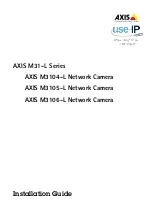
ETHERLINK II - Repeater
Manual
Page 22 of 106
3.6
Description of S-Access Etherlink_II interfaces
3.6.1 xDSL interface
The operation modes described below refer to the line interface of the device.
The S-Access ETHERLINK_II devices can have 1, 2 or 4 xDSL interfaces. The interfaces can
operate independently of each other.
All independent xDSL interfaces and groups of xDSL interfaces operating in the multipair mode
can be configured separately from the other xDSL interfaces. The multipair mode, the
reservation mode and the mode of automatic configuration detection naturally limit independent
functioning of the interfaces.
All interfaces support the plesiochronous data transmission. It means that reference clock
frequencies, which are used to clock data transmission, can transmit data in different directions
in one xDSL link.
The clock frequencies of different xDSL channels are completely independent if they do not
operate in the multipair mode.
If the xDSL channel is configured to operate in the independent mode (normal settings), it can
simultaneously transmit one or several E1 streams and one WAN stream. This transmission is
plesiochronous. All E1 streams received by one DSL interface should use the same clock
frequency in one direction.
Table 3.3 represents line settings in the independent mode.
Table 3.5 Line settings in the independent mode.
Mode
Coding type
Baserate
Data
transmissio
n rate
Standard
Manual
configuration,
Master, Slave
PAM16
3..60
Baserate* 64
kbit/s
Annex A, Annex B,
Annex
AB
(autodetection)
PAM32
12..89
Autodetection,
Master
PAM16
Auto (3..60)
Annex
AB
(autodetection)
PAM32
Auto (12..89)
Autodetection,
Slave
Auto
(PAM16,
PAM32)
Auto (3..89)
Annex
AB
(autodetection)
3.6.1.1 Master/Slave/Auto
To establish a connection, it is necessary that one transceiver has to be a
Master
and the other
– a
Slave
. In this case, the connection is controlled by the Master device. The regenerator can
also automatically detect the “Master/Slave operation modes. In this mode, the regenerator
automatically detects from the side of which of line interface the Master device and the Slave
modem are located.
The
MASTER ON/OFF
command (the Configuration management menu) is used to configure
the Master/Slave operation modes.
















































